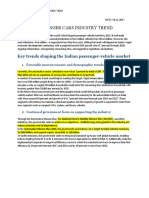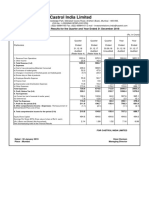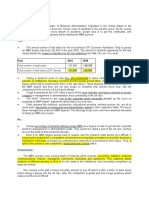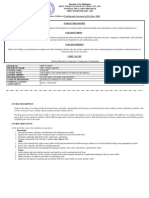0 ratings0% found this document useful (0 votes)
125 viewsGen X Vs Gen Y
Gen X Vs Gen Y
Uploaded by
Sona DuttaThere is an ongoing generational shift occurring in the workplace as Generation Y, also known as Millennials, enter the workforce. Gen Y, born between the mid-1970s and early 2000s, are more tech-savvy, ambitious, and have greater expectations of work-life balance than previous generations. However, their entrance is making Generation X, born between the 1960s and early 1980s, feel increasingly marginalized in the workplace. While Gen X and Y share some similarities in being technology-oriented and rebellious of older generations, Gen Y's larger population size and attitude are allowing them to demand and effect more changes, to the frustration of Gen X.
Copyright:
© All Rights Reserved
Available Formats
Download as DOCX, PDF, TXT or read online from Scribd
Gen X Vs Gen Y
Gen X Vs Gen Y
Uploaded by
Sona Dutta0 ratings0% found this document useful (0 votes)
125 views3 pagesThere is an ongoing generational shift occurring in the workplace as Generation Y, also known as Millennials, enter the workforce. Gen Y, born between the mid-1970s and early 2000s, are more tech-savvy, ambitious, and have greater expectations of work-life balance than previous generations. However, their entrance is making Generation X, born between the 1960s and early 1980s, feel increasingly marginalized in the workplace. While Gen X and Y share some similarities in being technology-oriented and rebellious of older generations, Gen Y's larger population size and attitude are allowing them to demand and effect more changes, to the frustration of Gen X.
Original Title
Gen X vs Gen Y
Copyright
© © All Rights Reserved
Available Formats
DOCX, PDF, TXT or read online from Scribd
Share this document
Did you find this document useful?
Is this content inappropriate?
There is an ongoing generational shift occurring in the workplace as Generation Y, also known as Millennials, enter the workforce. Gen Y, born between the mid-1970s and early 2000s, are more tech-savvy, ambitious, and have greater expectations of work-life balance than previous generations. However, their entrance is making Generation X, born between the 1960s and early 1980s, feel increasingly marginalized in the workplace. While Gen X and Y share some similarities in being technology-oriented and rebellious of older generations, Gen Y's larger population size and attitude are allowing them to demand and effect more changes, to the frustration of Gen X.
Copyright:
© All Rights Reserved
Available Formats
Download as DOCX, PDF, TXT or read online from Scribd
Download as docx, pdf, or txt
0 ratings0% found this document useful (0 votes)
125 views3 pagesGen X Vs Gen Y
Gen X Vs Gen Y
Uploaded by
Sona DuttaThere is an ongoing generational shift occurring in the workplace as Generation Y, also known as Millennials, enter the workforce. Gen Y, born between the mid-1970s and early 2000s, are more tech-savvy, ambitious, and have greater expectations of work-life balance than previous generations. However, their entrance is making Generation X, born between the 1960s and early 1980s, feel increasingly marginalized in the workplace. While Gen X and Y share some similarities in being technology-oriented and rebellious of older generations, Gen Y's larger population size and attitude are allowing them to demand and effect more changes, to the frustration of Gen X.
Copyright:
© All Rights Reserved
Available Formats
Download as DOCX, PDF, TXT or read online from Scribd
Download as docx, pdf, or txt
You are on page 1of 3
There always has been a generation gap since the dawn of civilization.
Old people act
like a frog in the well. They are fully convinced with their ideas as ultimate and ideal.
Many of us still might be struggling to bridge the gap between the generation X and the
elders but there is a new entrant in the generation hierarchy and that is Generation Y.
Generation X, commonly abbreviated to Gen X, is the generation born after the Western
post-World War II baby boom ended. The term generally includes people born in the
1960s and the '70s up through the early '80s, usually no later than 1982.
On the other hand, Generation Y, also known as the Millennial Generation (or
Millennials) are called Echo Boomers, due to the size of the generation and its relation to
the Baby boomer generation. As there are no precise dates when the Millennial
generation starts and ends, they are believed to be born somewhere from the mid-1970s
to the early 2000s.
Gen Y is often referred to as young, smart and bold. They aren’t consumed by fashion as
much as comfort and they typically have numerous electronic devices attached to them
that are in use simultaneously. The 70 million strong workforces who are just now
entering are the Generation Y.
The Millennials are sometimes called the "Trophy Generation", or "Trophy Kids," a term
that reflects the trend in competitive sports, as well as many other aspects of life, where
mere participation is frequently enough for a reward.
The Millennial Generation (or Gen Y), like other generations, has been shaped by the
events, leaders, developments and trends of its time. They are famous for their dot com
start-ups like Face book and College Humor, but equally as infamous for their entitled
attitudes and over-exuberance. These young entrepreneurs are fresh out of school (some
because they’ve dropped out all together) and have decided to take the world by storm,
with or without their parents support.
Gen Y may not be as exuberant in activist activities as their predecessors from the ’60s
and ’70s, but because of their strong relationship with technology and the Internet, this
generation is more aware of the world.
Gen Y is different in many respects from their upbringing to politics. Generation Y in
Asian countries show different preferences and expectations of work as compared to
those who grew up in the US or Europe. This is usually attributed to the differing cultural
and economic conditions experienced while growing up.
Also employing Gen Y may become dicey in the long run as they have too great
expectations from the workplace. They are incredibly ambitious, demanding, and often
question everything. Don’t expect loyalty to their company to be high on their priority
list; and if there is not a good reason for long hours or an extended commute, forget it.
They won’t consider either.
To address these new challenges, many large firms are currently studying the social and
behavioural patterns of Millennials and are trying to devise programs that decrease
intergenerational estrangement, and increase relationships of reciprocal understanding
between the older employees and Millennials.
But as the complexion of workplace changes, Generation X isn't happy to see Generation
Y as the new entrant in there domain of work. Both generations have similarities for sure.
Being tech savvy and the willingness to rebel against boomer norms have brought them
together for a short time. But as more of Gen Y enters the workplace, Gen X is becoming
increasingly marginalized.
Gen X works hard with little success. This is aggravated by Generation Y's readiness to
assume all the leadership positions when the Boomer generation retires. Gen X can't seem
to win and Gen Y reaps the rewards. Generation X is no doubt feeling like a stepping
stone generation, and many are, in fact, choosing to align themselves with Generation Y
rather than fade into the background.
Generation Y is 50% bigger than Generation X as they are dropping out of the workforce
to take care of their children, family. Generation Y has the same confidence, the same
ambition and the same savviness as Generation X had in their twenties, but the
demographics are in Gen Y’s favor. Y can ask for change and actually get it.
Generation X accepts diversity, has a pragmatic approach and are self-reliant. They reject
rules and have a killer life. They are tech savvy, multi-tasking and more hooked to PC.
They are latch-key kids and draw a line between family and friend. Regarding their work
they are casual and need a friendly work environment. They favour flexibility and
freedom.
Meanwhile, Generation Y celebrates diversity, are optimistic and self-inventive. They
rewrite rules and have killer lifestyle. They are irrelevant of the institutions and are more
addicted to internet. They assume technology and multi-task fast. They are nurtured and
equate friends as family. Regarding work they are more in favour of structured,
supportive work environment and believe more in personalized work and interactive
relationship. They are always prepared for demands and have high expectations.
Though the tug of war will continue between the two, but if you like Generation X,
you’re going to love Generation Y, because they’re like Generation X on fast forward
with self-esteem on steroids. These entrepreneurs run on pure passion. They’ve learned a
lot from their parents and have always been told they could do anything in the world.
And if we go by the figures they’re going to be the highest performing workforce in the
history of the world.
So, who would you bet on: Gen X or Gen Y?
You might also like
- Indian Youth As A Market and AudienceDocument20 pagesIndian Youth As A Market and AudiencepetrosNo ratings yet
- Math in Cultural Context - Annotated BibliographyDocument10 pagesMath in Cultural Context - Annotated Bibliographyapi-332693263No ratings yet
- Characteristic of Generation X Y and ZDocument5 pagesCharacteristic of Generation X Y and ZAbegail Reyes50% (2)
- 8 Key Differences Between Gen Z and MillennialsDocument13 pages8 Key Differences Between Gen Z and MillennialsHenrissa Granado Talan100% (1)
- How Something Sounds: Loudness: Teacher Note Answer KeyDocument6 pagesHow Something Sounds: Loudness: Teacher Note Answer KeyfairfurNo ratings yet
- Origin and History of GlobalizationDocument19 pagesOrigin and History of Globalizationjackielouleguro70100% (1)
- Reading in Philippine History, AQUINO, MARK ANGELO P.Document20 pagesReading in Philippine History, AQUINO, MARK ANGELO P.angelo aquino100% (1)
- Technology in Alternative Delivery System ReportDocument52 pagesTechnology in Alternative Delivery System Reportaxel saloma100% (1)
- Review Material - KKK & CustomsDocument4 pagesReview Material - KKK & CustomsCokky Quinto100% (1)
- GE 9 - Chapter 3 - Natural LawDocument35 pagesGE 9 - Chapter 3 - Natural LawCharm Angel Lopez100% (1)
- Art App QuizDocument5 pagesArt App QuizNicole OliverNo ratings yet
- Proclamation of IndependenceDocument10 pagesProclamation of Independenceyssay100% (1)
- For Philosophies of ArtsDocument16 pagesFor Philosophies of ArtsREYNAN ZAMORA100% (1)
- Group 5 Chapter 8 Legal and Ethical Use of TechnologyDocument44 pagesGroup 5 Chapter 8 Legal and Ethical Use of TechnologyNeilchoi Macalinao100% (1)
- Suicide: Juvenile DelinquencyDocument17 pagesSuicide: Juvenile DelinquencySeagal Umar100% (1)
- Contemporary ArtsDocument11 pagesContemporary ArtsJustine Cagabhion100% (2)
- Roles of The Internet and The WWW in EducationDocument9 pagesRoles of The Internet and The WWW in EducationPearly Luces100% (1)
- STS and Its Role in Nation BuildingDocument18 pagesSTS and Its Role in Nation BuildingMacy Lyn MendozaNo ratings yet
- Lesson 2 The Challenge of Cultural RelativismDocument13 pagesLesson 2 The Challenge of Cultural RelativismTUBON, Jamaireen T.100% (1)
- Lawrence Kohlberg's TheoryDocument16 pagesLawrence Kohlberg's TheoryBhelsea100% (1)
- Task 1: Unit 1 AssessmentDocument2 pagesTask 1: Unit 1 AssessmentAndamin MalaNo ratings yet
- Lesson 2-STS and Nation BuildingDocument5 pagesLesson 2-STS and Nation BuildingRaquelMagtalas100% (1)
- Group-8 Midterm TP 4Document5 pagesGroup-8 Midterm TP 4Karylle Samantha SotomangoNo ratings yet
- Lesson 15: Millenials and Filinnials: Who Are The Millennials?Document3 pagesLesson 15: Millenials and Filinnials: Who Are The Millennials?Ganda GandaNo ratings yet
- Technolgy For Teaching and Learning Week 1 To 4 MidermDocument31 pagesTechnolgy For Teaching and Learning Week 1 To 4 Midermnellrose emlanoNo ratings yet
- reviewerRPH 023756Document20 pagesreviewerRPH 023756Leannie Baquilod100% (1)
- OBE Syllabus Technology For Teaching and LearningDocument13 pagesOBE Syllabus Technology For Teaching and LearningApril Lourdes Punzalan AragonNo ratings yet
- Challenges of Filinnials and Millennials 1st Sem 2023 2024Document11 pagesChallenges of Filinnials and Millennials 1st Sem 2023 2024Jessa Palma100% (1)
- Ideological Dimensions of Globalization: LeaderDocument14 pagesIdeological Dimensions of Globalization: LeaderBryce PastorfideNo ratings yet
- Summer Midterm Exam DraftDocument3 pagesSummer Midterm Exam DraftFrancis100% (1)
- Introduction Key Concepts in EthicsDocument28 pagesIntroduction Key Concepts in EthicsIvy Rose Marticio100% (1)
- Gec 8 Lesson 8 Media and GlobalizationDocument26 pagesGec 8 Lesson 8 Media and GlobalizationRabiah MabungaNo ratings yet
- How Sexual Violence Impacts Our LivesDocument40 pagesHow Sexual Violence Impacts Our Livessam22100% (1)
- Week 10 STS Asynchronous Module 8Document6 pagesWeek 10 STS Asynchronous Module 8AcelaAlyssaAdormeoNo ratings yet
- Lesson 2-Technology As A Way of RevealingDocument2 pagesLesson 2-Technology As A Way of RevealingJemalyn Hinggo100% (1)
- Millennials - FilinnialsDocument16 pagesMillennials - FilinnialsZac Tyler100% (1)
- Globalization Today and TomorrowDocument168 pagesGlobalization Today and TomorrowAnanta SwargiaryNo ratings yet
- TOPIC 7 LESSON 1 TASK 1 MatamisDocument16 pagesTOPIC 7 LESSON 1 TASK 1 MatamisJolina Lastimoso MatamisNo ratings yet
- Cultural Relativism in EthicsDocument23 pagesCultural Relativism in Ethicskim rina100% (1)
- Ge 8 STS Week 23Document20 pagesGe 8 STS Week 23student part timeNo ratings yet
- Ethical RelativismDocument35 pagesEthical RelativismTHEO DOMINIC REQUERME SILVOSANo ratings yet
- Subject Name: STS 101 Subject Descriptive Title: Science, Technology, and SocietyDocument2 pagesSubject Name: STS 101 Subject Descriptive Title: Science, Technology, and SocietyMayrell PanoncialNo ratings yet
- STS FinalsDocument4 pagesSTS FinalsCrestina100% (1)
- 2 GE Course Outline - Science, Technology & SocietyDocument6 pages2 GE Course Outline - Science, Technology & Societypeterpaul_1211No ratings yet
- ReviewersDocument9 pagesReviewersTrisha Mae GresosNo ratings yet
- The Sociological Perspective: "Seeing The General in The Particular"Document34 pagesThe Sociological Perspective: "Seeing The General in The Particular"Cassandra OlivaresNo ratings yet
- 1 - The Medawar Lecture 1998 - Is Science Dangerous - Lewis WolpertDocument7 pages1 - The Medawar Lecture 1998 - Is Science Dangerous - Lewis WolpertJamie ToriagaNo ratings yet
- Chapter Two: Normative Theories of EthicsDocument37 pagesChapter Two: Normative Theories of EthicsSantiya SubramaniamNo ratings yet
- CHAPTER 1 Introduction To HistoryDocument53 pagesCHAPTER 1 Introduction To HistoryAngie Cadorna0% (1)
- What Is Globalization?: From Different Perspectives/LensesDocument9 pagesWhat Is Globalization?: From Different Perspectives/LensesAce Chen100% (1)
- Rules of OriginDocument14 pagesRules of OriginRasul0% (1)
- Anth 101-Lecture Notes Theme TwoDocument31 pagesAnth 101-Lecture Notes Theme TwoAmy GreyNo ratings yet
- Basic Universal ValuesDocument20 pagesBasic Universal ValuesStella Jung100% (1)
- Lesson 8 When Technology and Humanity CrossDocument45 pagesLesson 8 When Technology and Humanity CrossMelvin Earl Agda100% (1)
- How Generation Y WorksDocument3 pagesHow Generation Y WorkssyaheerazulkifliNo ratings yet
- Generation XDocument2 pagesGeneration XRaraNo ratings yet
- Millenials and Filinnials Ethical Challenges and ResponsesDocument3 pagesMillenials and Filinnials Ethical Challenges and ResponsesChristian EspirituNo ratings yet
- Generation DifferencesDocument3 pagesGeneration DifferencesAnooshaNo ratings yet
- Meaning and Relevance of History From Generation X/Y/ZDocument2 pagesMeaning and Relevance of History From Generation X/Y/ZMary Rose RosalesNo ratings yet
- SVPP Introjecté Generation 2000Document13 pagesSVPP Introjecté Generation 2000spammoipleaseNo ratings yet
- Outline SOC 210Document7 pagesOutline SOC 210AnjNo ratings yet
- Indian EconomyDocument2 pagesIndian EconomySona DuttaNo ratings yet
- Indian EconomyDocument2 pagesIndian EconomySona DuttaNo ratings yet
- Lubrication in EVsDocument3 pagesLubrication in EVsSona DuttaNo ratings yet
- Manu. Process and ThermoDocument10 pagesManu. Process and ThermoSona DuttaNo ratings yet
- Major Manufacturing Facilities: Collaboration / Technical Tie-UpsDocument11 pagesMajor Manufacturing Facilities: Collaboration / Technical Tie-UpsSona DuttaNo ratings yet
- NIT Sil DetailDocument1 pageNIT Sil DetailSona DuttaNo ratings yet
- National Election ScheduleDocument2 pagesNational Election ScheduleSona DuttaNo ratings yet
- Indian EconomyDocument2 pagesIndian EconomySona DuttaNo ratings yet
- Passenger Cars Industry Trend 18-19Document7 pagesPassenger Cars Industry Trend 18-19Sona DuttaNo ratings yet
- How Shock Absorber WorksDocument3 pagesHow Shock Absorber WorksSona DuttaNo ratings yet
- Engg. Q From TIMEDocument15 pagesEngg. Q From TIMESona DuttaNo ratings yet
- Castrol India Limited: Statement of Audited Financial Results For The Quarter and Year Ended 31 December 2018Document3 pagesCastrol India Limited: Statement of Audited Financial Results For The Quarter and Year Ended 31 December 2018Sona DuttaNo ratings yet
- Digital Payments in IndiaDocument3 pagesDigital Payments in IndiaSona DuttaNo ratings yet
- Packages With A Total of 14 Items. The Contracted Prices of 7 Items Were Higher Than The "Aligned Price", TheDocument1 pagePackages With A Total of 14 Items. The Contracted Prices of 7 Items Were Higher Than The "Aligned Price", TheSona DuttaNo ratings yet
- CSR - Source MBA RendezvousDocument3 pagesCSR - Source MBA RendezvousSona DuttaNo ratings yet
- Farm Loan Waivers - Good or BadDocument2 pagesFarm Loan Waivers - Good or BadSona DuttaNo ratings yet
- Is MBA A Rat RaceDocument1 pageIs MBA A Rat RaceSona DuttaNo ratings yet
- Data Is The New OilDocument1 pageData Is The New OilSona DuttaNo ratings yet
- Graduation Goal Setting AssignmentDocument1 pageGraduation Goal Setting Assignmentapi-374868952No ratings yet
- Extended Essay LessonsDocument3 pagesExtended Essay LessonsjamesdeignanNo ratings yet
- The Ideal CitizenDocument5 pagesThe Ideal CitizenWyatt ShelyNo ratings yet
- Hiren Resume 1Document3 pagesHiren Resume 1Renee BarronNo ratings yet
- William Blake, A DissenterDocument7 pagesWilliam Blake, A DissenterMichelle Macías ValarezoNo ratings yet
- Validity and Effectiveness of Students Worksheet Based On Hands On Minds On Activities in Angiosperms Material To Train Argumentation Skill PDFDocument5 pagesValidity and Effectiveness of Students Worksheet Based On Hands On Minds On Activities in Angiosperms Material To Train Argumentation Skill PDFbagusNo ratings yet
- UCSP Module 3Document46 pagesUCSP Module 3Jude TanNo ratings yet
- Bab 1-3Document50 pagesBab 1-3Lieyanha Thandtye CiieladyrozeWanabeeNo ratings yet
- Santa Fe NAACP Newsletter APRIL 2009Document9 pagesSanta Fe NAACP Newsletter APRIL 2009Santa Fe Branch NAACPNo ratings yet
- Y2 LP Civic Edu August Keeping The School Clean My School My HomeDocument1 pageY2 LP Civic Edu August Keeping The School Clean My School My HomeShi Ze100% (1)
- Bonjour!Document32 pagesBonjour!Geraldine Montevirgen BiaganNo ratings yet
- Eco-Critical Analysis of Hemingway's The Old Man and The SeaDocument5 pagesEco-Critical Analysis of Hemingway's The Old Man and The SeaMã Văn Tài100% (1)
- National Taiwan University of Science and Technology: International Student AdmissionDocument9 pagesNational Taiwan University of Science and Technology: International Student Admissiontanto_deep_15No ratings yet
- Response To The Man of Mode (Sept. 2005? Scanned)Document3 pagesResponse To The Man of Mode (Sept. 2005? Scanned)Patrick McEvoy-HalstonNo ratings yet
- Horoscope Columns Teacher's Notes: ObjectivesDocument9 pagesHoroscope Columns Teacher's Notes: ObjectivesUrška KlasincNo ratings yet
- Pads in The Bush: Dan MclarenDocument3 pagesPads in The Bush: Dan Mclarenvampirek91No ratings yet
- Lesson Plan 8Document5 pagesLesson Plan 8api-310800145No ratings yet
- Grammar in Use - ListDocument2 pagesGrammar in Use - Listrobgomesrrr0% (1)
- Tell Us Stories, Please! Storytelling For Young Learners of English Chairina Nasir, Nurul InayahDocument5 pagesTell Us Stories, Please! Storytelling For Young Learners of English Chairina Nasir, Nurul InayahRezki HermansyahNo ratings yet
- Physical Education 3 Individual and Dual SportsDocument4 pagesPhysical Education 3 Individual and Dual SportsDanica QuinacmanNo ratings yet
- "Hard Writing Makes Easy Reading, Easy Writing Makes Hard Reading" William ZinsserDocument33 pages"Hard Writing Makes Easy Reading, Easy Writing Makes Hard Reading" William ZinsserAngela RuedasNo ratings yet
- Prof. Dr. Khaliq Dad MalikDocument4 pagesProf. Dr. Khaliq Dad MalikArmaghan0% (2)
- Portfolio and Reflective Statement - v2Document20 pagesPortfolio and Reflective Statement - v2Hamdan HamzahNo ratings yet
- Readings For Ronald ReaganDocument13 pagesReadings For Ronald ReaganRichard YuNo ratings yet
- Course Syllabus in Teaching and Assessment of The Macro SkillsDocument13 pagesCourse Syllabus in Teaching and Assessment of The Macro SkillsLarrizze GallardoNo ratings yet
- School Form 5 (SF 5) Report On Promotion and Learning Progress & AchievementDocument1 pageSchool Form 5 (SF 5) Report On Promotion and Learning Progress & AchievementChristina Aguila NavarroNo ratings yet
- DLL 8-1Document3 pagesDLL 8-1Vy Rañoa Paz100% (1)
- Evolo Skyscraper Winner 2014 Transforms Korean 'Hanok' Into Impressive High-Rise - ArchDailyDocument7 pagesEvolo Skyscraper Winner 2014 Transforms Korean 'Hanok' Into Impressive High-Rise - ArchDailyKim SejeongNo ratings yet
- Artwars StrategyforteachingpoetryDocument1 pageArtwars Strategyforteachingpoetryapi-267805755No ratings yet











































































































